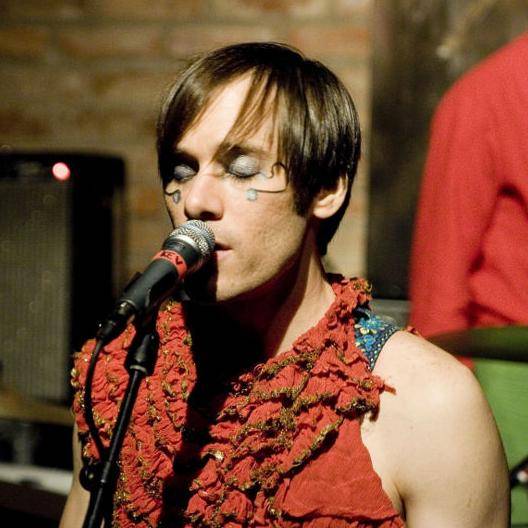Pioneering indie group of Montreal will be returning to the Canopy Club in Urbana tonight to kick off the Pygmalion Music Festival with special guest (and Kevin Barnes collaborator) Janelle Monae. Kevin Barnes, whose responsibilities in the band only include lead vocals, talked to me about his approach.
The band, active since the mid-nineties, achieved widespread acclaim with 2004’s Satanic Panic in the Attic and following albums the Sunlandic Twins and Hissing Fauna, Are You the Destroyer?. Their blend of verbose (and sometimes dark) songwriting with upbeat pop melodies and legendary live theatrics makes them a truly unique musical experience.
 Erik Allgood: This is not your first time in Urbana. Honestly, how do venues like the Canopy Club compare to the rest of the national music scene? What made you decide to play Pygmalion?
Erik Allgood: This is not your first time in Urbana. Honestly, how do venues like the Canopy Club compare to the rest of the national music scene? What made you decide to play Pygmalion?
Kevin Barnes: We love the Canopy Club. The environment is really laid back and it’s not some rigid, structured thing. We’re glad to be back.
EA: Will there be any new material tomorrow?
KB: We’ll be doing several songs from our new album, False Priest, which has already been released. But, no, we won’t be doing any unreleased material.
EA: With Skeletal Lamping, you released the album along with a series of merchandise featuring the album art. What went into this marketing decision?
KB: I think album artwork is really important. Can you imagine, for example, Sgt. Pepper’s without the artwork? It’s an important part of the album. If you just have a little thumbnail along with the track you downloaded off of Itunes — or nothing if you pirated the album — you’re not getting the full experience.
EA: And your brother [David Barnes] does a lot of the album artwork?
KB: Yes, my brother and my wife [Nina Barnes].
EA: Especially in the more recent albums, of Montreal has featured some heavy narration in the songwriting. Do you see yourself as a storyteller who’s also a musician or a musician who’s also a storyteller?
KB: I don’t really see myself as a storyteller so much as just saying what on my mind. The music explores whatever I’m focusing on while I’m writing it.
EA: You explore some pretty nihilistic themes in some of your songwriting — accompanied by upbeat music to great effect. What was your reasoning for this creative decision?
KB: I don’t really listen to downbeat music. If I’m feeling bad about something I wouldn’t listen to a downbeat song, because it wouldn’t make me feel better. I only listen to upbeat music, so that’s what we play.
EA: How and why did you transition from the more lo-fi sounds of the earlier albums to a more polished pop sound?
KB: I wouldn’t say our sound is “polished” so much. When I was first starting out I didn’t really know what I was doing as much, so the songs came out having an unfinished sound. I still do most of the production myself. The only difference is that now I’m better at it. I wouldn’t say polished, though, because I don’t want to make songs that sound like everything else out there.
EA: Where does of Montreal shine the most: the studio or live performance?
KB: They both have their advantages. I mean, like I said, I’m alone in the studio a lot. Live performances are fun because then I’m collaborating with everyone else for an audience.
EA: You’re known for your insane theatrics, mid-concert costume changes and glam stage presence. Are you channeling anybody and if so, who?
KB: Well, I think anybody who does this kind of stage performance owes a debt to people like David Bowie and anybody else who came before him — Peter Gabriel, Alice Cooper and others. We incorporate influences from everybody who came before us and add our own approach to it.
EA: Does of Montreal have politics?
KB: The only politics I’d say of Montreal has is just have a good time and, of course, be accepting of other people. One of the things about us dressing up and getting up on stage and acting ridiculous is that — no matter what you wore to the show or how you act at the show — there’s no way you’re acting weirder than we are on stage. So ideally, we want people to loosen up while they’re at our show and overcome whatever insecurities they might have coming in.
EA: How would you compare your sound to the rest of the indie pop scene?
KB: The great thing about indie music is that it’s so broad. Everyone is doing their own thing. It’s not like R & B or hip-hop where there’s a standard for how the music has to sound to be categorized as it. It frees us up to do something outside the norm — not that you can’t do that at all in other genres.
EA: Who are your influences?
KB: There are a lot of really obvious ones like David Bowie, The Beatles, The Kinks and Os Mutantes. Basically anything I’ve ever heard has had an impact on my music.
EA: Most members of the band have their own side projects, like in many other bands in Elephant Six. How do you pick them and what are you working on now?
KB: I collaborated on a few songs on Solange Knowles new album — and there’s Monae. Right now, I’m looking for projects that catch my interest and another of Montreal project.
of Montreal and Janelle Monae perform tonight (September 22nd) at the Canopy Club. Tickets are sold-out, but festival wristbands are still on sale and will get you into the show. Janelle Monae goes on stage at 9:00, followed by of Montreal at 10:30.
Image by Jonas Hamre/via Wikipedia (public domain)








